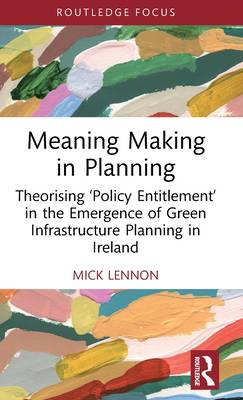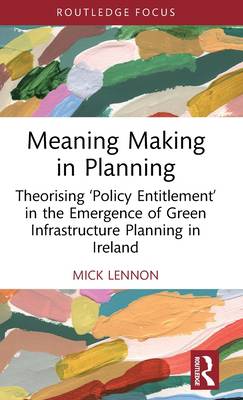
- Retrait gratuit dans votre magasin Club
- 7.000.000 titres dans notre catalogue
- Payer en toute sécurité
- Toujours un magasin près de chez vous
- Retrait gratuit dans votre magasin Club
- 7.000.000 titres dans notre catalogue
- Payer en toute sécurité
- Toujours un magasin près de chez vous
Meaning Making in Planning
Theorising 'Policy Entitlement' in the Emergence of Green Infrastructure Planning in Ireland
Mick LennonDescription
Planning theorists normally focus on issues of contest and critique. The field of planning theory is thereby replete with studies of conflict, collaboration and criticism. Considerably less critical attention is afforded to policy approaches that emerge, evolve and are widely adopted in the apparent absence of discord. This book addresses this knowledge gap.
A case study of the emergence of green infrastructure policy in Ireland is used to both inform and illustrate a theory of 'Policy Entitlement'. This interpretive approach focuses on meaning making in context to explain the counter-intuitive processes through which a new policy concept can emerge and reprofile planning activities by producing the seemingly pre-existing objective reality to which such policy is then applied and the discipline (re)orientated. This approach accounts for how a new planning concept can appear to resolve problematic policy ambiguity by suspending disagreement on issues where dispute could be expected.
This book will be of interest to those studying planning theory and the policy process, as well as those concerned with the undertheorized but swift rise to prominence of green infrastructure planning.
Spécifications
Parties prenantes
- Auteur(s) :
- Editeur:
Contenu
- Nombre de pages :
- 146
- Langue:
- Anglais
Caractéristiques
- EAN:
- 9781032535838
- Date de parution :
- 26-06-23
- Format:
- Livre relié
- Format numérique:
- Genaaid
- Dimensions :
- 140 mm x 216 mm
- Poids :
- 331 g







